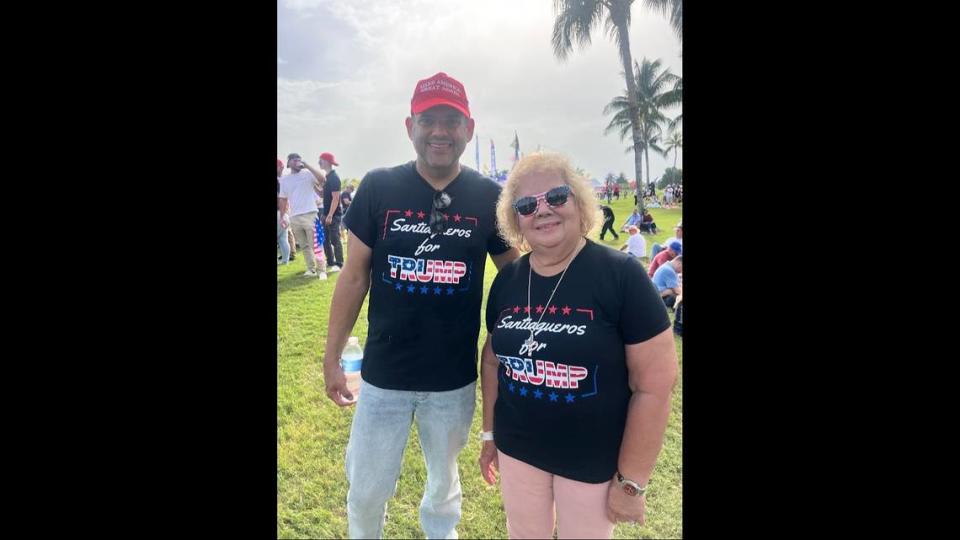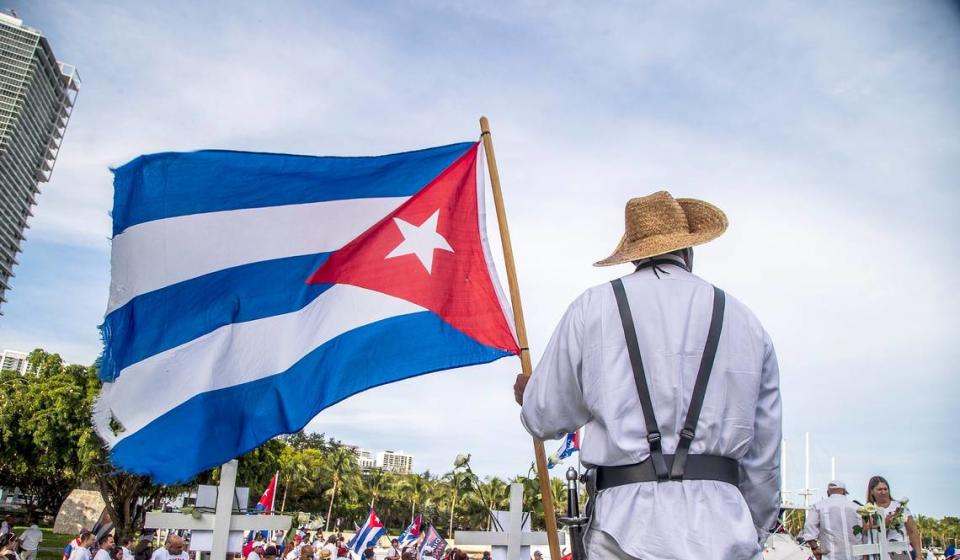Why Hispanic immigrants who support Trump are embracing his hardline border stance
- Oops!Something went wrong.Please try again later.
- Oops!Something went wrong.Please try again later.
Having flown to Miami from California to see Donald Trump speak in person, Teresa Algarín waited eagerly with her nephew at the former president’s golf resort in Doral last week, sporting a t-shirt custom-designed to show her Cuban roots and her support for this year’s Republican presidential nominee.
Displayed proudly on her chest were the words “Santiagueros for Trump,” an homage to Santiago de Cuba, where she lived before coming to the U.S. 54 years ago. “God bless Trump and this country,” she said.
The Algaríns are among the many naturalized Hispanic voters that support Trump’s hardline immigration stances, including shutting down the southern border.
“We are going through very difficult times where the current president is giving away the country to the entire world,” Rafael Algarín, a Miami-Dade resident, told the Miami Herald, speaking in Spanish. “We have to defend that everyone who comes in follows the same steps we followed. If we come to grow this country, let’s grow it, not become the rubbish in the countries we left behind.”
Though President Joe Biden remains likely to win a majority of the Hispanic vote nationally, a TelevisaUnivision poll released on Tuesday found Trump leading among Florida Latinos, nearly half of whom believe Republicans have a better handle on immigration and border security compared to Democrats. The results mirror what pollsters have also seen among Latino voters in key battleground states: That Democrats have lost the confidence of many Hispanics on immigration policy, with one survey from Equis Research finding that registered Latinos voters trust Trump more than Biden on the issue.
READ: Trump wants local police help on deportations. GOP sheriff candidates: not in Miami-Dade
Trump, who survived an assassination attempt at a Pennsylvania rally over the weekend, is centering his campaign on illegal immigration as a national security threat. He has pledged to launch the biggest deportation campaign of undocumented people in the country’s history, a promise that Republicans formalized in the party platform released ahead of this week’s GOP convention in Milwaukee.
The level of support among Hispanic voters for Trump’s policies comes as the Biden administration has struggled to process the high volume of people trying to enter the U.S. In recent months, Biden has temporarily suspended asylum eligibility at the border, and hardened his rhetoric, focusing on his efforts to limit illegal immigration — something Hispanic voters at Trump’s rally said they want from the next president.
“I would be very disappointed if on day one, he doesn’t close the border,” Marilyn Thomson, a U.S.-born Homestead resident who is the daughter of Cuban immigrants, said of Trump.

Republican immigration policies
While Trump was in office, his administration limited asylum eligibility, made migrants wait in Mexico for their court hearings, and completed 450 miles of the southern border’s wall. He also tried to end Deferred Action for Childhood Arrivals, which grants deportation protections and work authorizations to people who came to the United States as children.
In its 2024 platform, the GOP has pledged to restore Trump’s immigration policies and to “seal the border, and stop the migrant invasion.” The document, released earlier this month, says that if a new Trump administration would increase penalties for illegal entry and overstaying visas, beef up Immigration and Customs Enforcement, and restore Title 42, a public health measure used during COVID-19 to quickly expel migrants and asylum seekers at the border.
READ: As Trump threatens deportations, Miami’s undocumented grapple with uncertain future
Republicans, though, are making a concerted effort to court Hispanic voters in their campaigns. A Nicaraguan immigrant was one of the first speakers to address delegates on the first night of the Republican National Convention.
“Our open borders are making this problem worse,” said Linda Fornos, who came from the Central-American country six decades ago and now lives in Las Vegas. The finance adviser said she and her family lost everything in a house fire two years ago and blamed Biden’s policies for their struggles to recover.
“It’s upsetting to see millions of dollars being sent to help immigrants who came here illegally while hardworking families who did it the right way are left struggling. The fact is, that illegal immigration hurts legal immigrants the most,” she said.
“The largest deportation campaign in American history”
For some Latin American immigrants, the situation at the border reminds them of their home countries, where the rule of law might not be as strong, said Armando Ibarra, chairman of the Miami Young Republicans. He told the Herald that Hispanics in the U.S. are looking towards cities like New York, which have received an unprecedented number of immigrants in the past two years; so many that their shelters are overflowing.
“The people that they impact the most are working class, Latino and Black voters,” he said. “We’re seeing so many Hispanic Latino voters negatively impacted by the fact that their social services are overwhelmed by this large illegal immigrant flow.”
READ: Trump’s mass-deportation plan would have big economic consequences for South Florida
Alex Berrios, CEO and co-founder of Mi Vecino, an organization focused on voter rights and outreach, said Latinos in South Florida connect immigration to other top issues such as the economy and public safety because Trump links them together. Polling has consistently shown that the economy is a top concern among Hispanics.
“It’s less about immigration itself and more about the factors surrounding how these policies are being presented in South Florida,” he said.
He told the Herald that the former president taps into the fears many bring from their homelands. Berrios said that Trump is building on previous success from 2016 and 2020, with the rhetoric that criminals are coming to the U.S. from other countries — even though research has shown that migrants are convicted at lower rates for crimes than their U.S.-born counterparts.
On the second night of the Republican National Convention, several high-profile Republicans amplified Trump’s characterizations of undocumented immigrants as lawbreakers. They also accused the Democratic party of facilitating non-citizen voting, though statistics show that such incidents are extremely rare.
“We are facing an invasion on our southern border. Not figuratively. A literal invasion…. Every day, Americans are dying. Murdered, assaulted, raped by illegal immigrants that the Democrats have released,” said Cuban-American Senator Ted Cruz, of Texas, who lost against Trump in the 2016 GOP primary.
Berrios told the Herald that Latinos who support the Republican presidential nominee disassociate themselves from those negative depictions of new arrivals.
“When we talk to Latinos, they’re not hearing, ‘Oh, he’s calling Latinos like me rapists and criminals, even though I’m also an immigrant,’” he said. “He’s talking about those actual criminals that are over there.”
Diversity of opinions
The crowd at Trump’s Doral rally showcased the diverse perspectives among his Hispanic supporters, who come from an array of backgrounds. Many of Trump’s South Florida supporters are Cuban Americans, who receive special privileges when immigrating to the U.S. and have historically voted Republican.
Santiago Ferran Barnet, a 62-year-old Havana man who regularly dresses up as a Cuban independence fighter for Trump rallies, came to the U.S. by boat 22 years ago. He said he was “lucky” that he was able to stay in the U.S. under a policy known as “Wet Foot, Dry Foot,” which put Cubans who touch American soil on a fast track to American citizenship. Former President Barack Obama ended the policy in 2017, days before Trump was sworn into office.
“Terrible for those who came after. Congratulations to me,” said Ferran Barnet. “A country is a home. You let whoever you want into your house. If you think someone doesn’t qualify, don’t let them in … You don’t leave the door of your house open. That’s common sense. Not politics.”

Teresa Algarín, the California Cuban who came with her nephew to the rally, told the Herald that she had to wait for three and a half years in Cuba before she could come to the United States, and others should likewise enter the country through legal means.
“I came totally legally and that’s what I defend,” she said.
Some at the rally backed Trump’s mass-deportation plans. Others would like the federal government to keep current avenues to legal immigration, such as asylum and work visas. One Trump supporter told the Herald there should be amnesty for undocumented immigrants who haven’t committed crimes and have lived in the U.S. for years – a position that 63% of Hispanic Florida voters in the TelevisaUnivision poll agreed with, signaling that there could be tensions among Trump supporters over his mass deportation plans.
Hector Clark, an immigrant from Venezuela who came to the U.S. 20 years ago on a student visa, believes that Trump should prioritize merit-based immigration of people who will contribute to the United States.
“We should know who the person is before saying they can enter. But to open the door for everyone to come in, I don’t agree with that,” he said. “We should have a system to know who is entering and not leave the door open for anyone who wants to pass through.”

